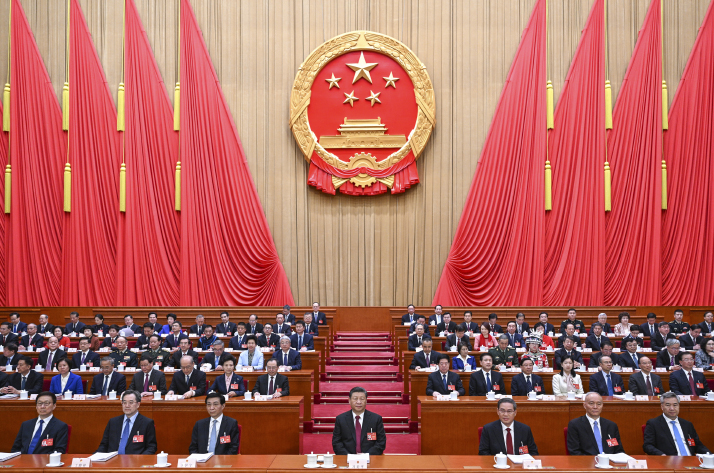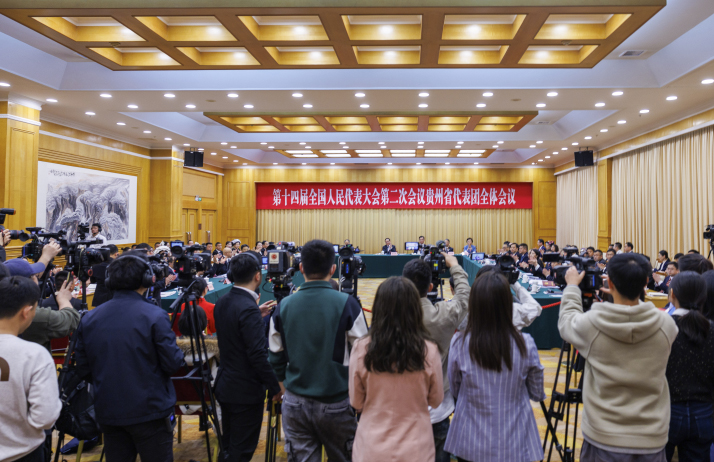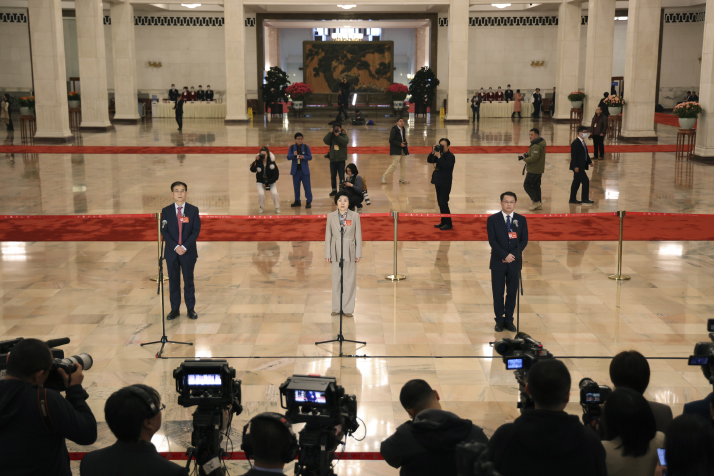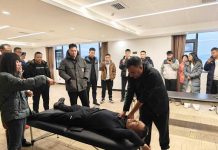
China has set its GDP growth target at around 5 percent for this year. The growth target was revealed in the government work report delivered by Premier Li Qiang at the opening meeting of the Second Session of the 14th National People’s Congress (NPC), China’s top legislature, in Beijing on March 5.
The report reviewed the country’s achievements over the past year and outlined its future direction.
The projected GDP growth goal is consistent with last year’s growth target. The Chinese economy showed strength and resilience in 2023, recording a year-on-year growth of 5.2 percent. GDP matters because it gauges the size and health of an economy within a given period of time.
This 5-percent growth rate is in line with the goals of the country’s 14th Five-Year Plan (2021-25) and its aspiration to achieve modernization. Five-year plans serve as China’s policy blueprints for medium-term social and economic development, with the 14th such plan covering the period from 2021 to 2025. Focused on high-quality economic development, the country’s vision for national modernization intends to create tangible improvement in people’s lives.
The growth rate also considers the potential for growth and the factors supporting it, reflecting the imperative to pursue progress and strive to deliver, according to Li.
Han Baojiang, head of the China Market Economics Society and a national political advisor, said the GDP growth objective is both pragmatic and inspiring, indicating the Central Government’s continued emphasis on the quality of growth.

Achievements and aims
The country remains a crucial driver of global development, with its economy rebounding in 2023 and contributing around 30 percent to world economic growth.
While challenges persist in furthering China’s economic recovery, the overall trend of recovery and long-term improvement remains unchanged. The Chinese leadership has emphasized the importance of pursuing progress while maintaining stability. Consolidating and bolstering the momentum of economic recovery are of the utmost importance.
“In setting the growth rate at around 5 percent, we have taken into account the need to boost employment and incomes and prevent and mitigate risks,” Li stated.
In 2024, China aims to create over 12 million jobs in urban areas and keep the surveyed urban unemployment rate at approximately 5.5 percent, the work report outlined.
“As employment is the most basic component of the people’s wellbeing, we will give greater priority to it,” Li said.
The number of China’s college and university graduates is projected to exceed 11.7 million this year, according to the report. “We must do more to promote employment for young people and provide better guidance and services to help them secure jobs or start businesses,” Li added.
The number of graduates in China has been breaking records in the past few years. The figure surpassed 10 million for the first time in 2022 and reached nearly 11.6 million last year. In 2023, China’s urban areas created 12.44 million new jobs, exceeding the target of around 12 million.
Last year, the Chinese economy underwent a period of stabilization and recovery, marked by the implementation and fine-tuning of policies focused on employment, Zhang Chenggang, a job market researcher at the Capital University of Economics and Business in Beijing, told Beijing Review. “The average surveyed urban unemployment rate stood at 5.2 percent, indicating relative stability in the labor market,” he explained. However, the researcher also noted that workers encountered challenges such as sluggish wage growth, extended working hours and heightened competition pressure.
Zhang underlined the need to explore new avenues for employment and entrepreneurship for the younger generations.
He highlighted the potential of rural revitalization—a comprehensive strategy promoting economic development, improving living standards in rural areas and narrowing the urban-rural divide, the global expansion of Chinese enterprises, the digital transformation of traditional industries and digital platforms to provide new and more employment opportunities for young people in the future.
“Plus, we should strengthen employment guidance for youth, adjusting their expectations, helping them to create career development plans and enhancing their employability,” he said.
The work report emphasized efforts to secure employment for ex-service members, rural migrant workers and other vulnerable groups, while also providing increased assistance to jobseekers facing difficulties, including people with disabilities, and improving support for those in flexible employment.

Lifting livelihoods
The work report highlighted the government’s commitment to ensuring and enhancing people’s wellbeing, improving public services, and addressing key public concerns.
In the realm of medical and health services, the country will prioritize the prevention and control of major infectious diseases. Government subsidies for basic medical insurance for rural and non-working urban residents will be raised by an average of 30 yuan ($4.16) per person. Critical service gaps in fields such as pediatrics, geriatrics, mental health and nursing will be further addressed.
China will also improve the minimum basic old-age benefits for rural and non-working urban residents, ensure comprehensive support for ex-service personnel, and improve policies to stimulate higher birth rates. This will involve refining parental leave policies, enhancing the mechanism for sharing employers’ related labor costs and expanding the provision of childcare services through multiple channels.
Data from the National Bureau of Statistics (NBS) in January showed that China’s population had decreased by 2.08 million people in 2023 to 1.40967 billion. During the same year, 9.02 million babies were born, resulting in a birth rate of 6.39 per 1,000 people. Meanwhile, 11.1 million people died in 2023, equal to a death rate of 7.87 per 1,000 people.
This led to a negative natural population growth rate of 1.48 per 1,000 people.
To enrich people’s cultural lives, more creative and artistic projects will be introduced to benefit the public and improve the services of free public cultural facilities.
Efforts will also be made to promote the systematic protection and responsible use of cultural artifacts, as well as the safeguarding and preservation of intangible cultural heritage.
China and the world
“If China can deliver its growth target, that would be spectacular. The Chinese economy is so large that any level of growth helps the folks in China, and it makes China a contributor to overall growth in the world. And so there’s a knock-on effect: If China does well, China will also consume,” Michael Hart, President of the American Chamber of Commerce in China, told Beijing Review.
The work report stated that China will pursue a higher standard of opening up and promote mutual benefits. Specifically, efforts will be made to steadily increase the volume and raise the quality of foreign trade.
Commerce Minister Wang Wentao mentioned at a news conference on March 6, during the annual NPC gathering, that positive signs have emerged as China’s foreign trade sector maintained its growth momentum in the first two months of this year. And many enterprises are expanding their market presence by participating in trade shows and venturing abroad.
To further improve foreign trade, China will intensify support for import and export credit, export credit insurance, as well as improve cross-border settlements, risk management for foreign exchange and other related services, according to the report.
The country will deepen efforts to attract foreign investment. This includes shortening the negative list for foreign investment, a list of industries or sectors in which foreign investment is restricted or prohibited, and ensuring that foreign-funded enterprises can participate in government procurement, bidding, and standard-setting processes as per the law and on an equal footing.
The report also stated that all market access restrictions on foreign investment in manufacturing will be abolished, and market access restrictions in service sectors, such as telecommunications and healthcare, will be reduced.
The country will strengthen services for foreign investors to make China a favored destination for investment. Furthermore, efforts will be made to facilitate easier access for foreign nationals to work, study and travel in China.
Speaking for the people
Every year, the government work report is deliberated and approved by NPC deputies at the congress’ annual full session during China’s most important annual political event—the Two Sessions, which are typically held in Beijing in March.
During the Two Sessions, the NPC and the Chinese People’s Political Consultative Conference (CPPCC) National Committee, the country’s top political advisory body, convene to deliberate matters related to China’s social and economic development.
The meetings serve as a platform for discussing key policy initiatives, legislative matters and socioeconomic priorities for the nation. During these gatherings, delegates from diverse sectors of society, including government officials, business leaders and representatives of social organizations, come together to exchange ideas, propose solutions, and provide advice on critical issues facing the country.
The outcomes of the Two Sessions often have a substantial impact on the direction and shape of China’s development strategies and policies for the year ahead.
The NPC is a key institution in China’s political system and its role encompasses legislative duties, decision-making on important national matters, and oversight responsibilities. The renewal of its membership, or deputies, through elections every five years helps maintain the NPC’s responsiveness to the evolving needs and interests of the Chinese people.
The NPC currently consists of some 3,000 elected deputies. They were elected by the country’s provinces, autonomous regions, municipalities, special administrative regions and armed forces.
NPC deputies also review and approve the state budget as well as the work reports of the Supreme People’s Court and the Supreme People’s Procuratorate, which mainly deals with public prosecution and the supervision of criminal investigations.
The system of multiparty cooperation and political consultation under the leadership of the Communist Party of China is uniquely Chinese.
The CPPCC is a specialist consultative institution that provides advice on state governance by pooling wisdom from a wide spectrum of Chinese society. The CPPCC National Committee today has over 2,000 members. They include prominent figures from the political, economic, academic, scientific, artistic and sporting communities. Like NPC deputies, they draft and submit proposals to government departments for the wellbeing of the people.
According to government figures, in 2023, departments under the State Council, the executive body of the highest state organ of power, handled 12,480 suggestions and proposals submitted by NPC deputies and CPPCC National Committee members.
As they all come from a variety of sectors, their suggestions and proposals cover a wide range of topics. For example, Dong Mingzhu, an NPC deputy and Chairperson of Gree Electric Appliances, a well-known Chinese appliance manufacturer, suggested this year that the nation raise the threshold of individual income tax to 10,000 yuan ($1,389) per month from the current 5,000 yuan ($694).
Guo Jin, also an NPC deputy and deputy head of a museum dedicated to the Chengjiang Fossil Site, a UNESCO World Heritage Site that documents life on Earth from approximately 530 million years ago in Chengjiang, Yunnan Province, offered suggestions on strengthening the scientific research capabilities of local museums.
Zhao Xiaoguang, an associate professor of automation at the Institute of Automation at the Chinese Academy of Sciences and a member of the CPPCC National Committee, called for accelerating the application of artificial intelligence technology in industries, to tackle the challenges stemming from a new round of technological revolution and turn scientific and technological achievements into tangible results.
–The Daily Mail-Beijing Review News exchange item





